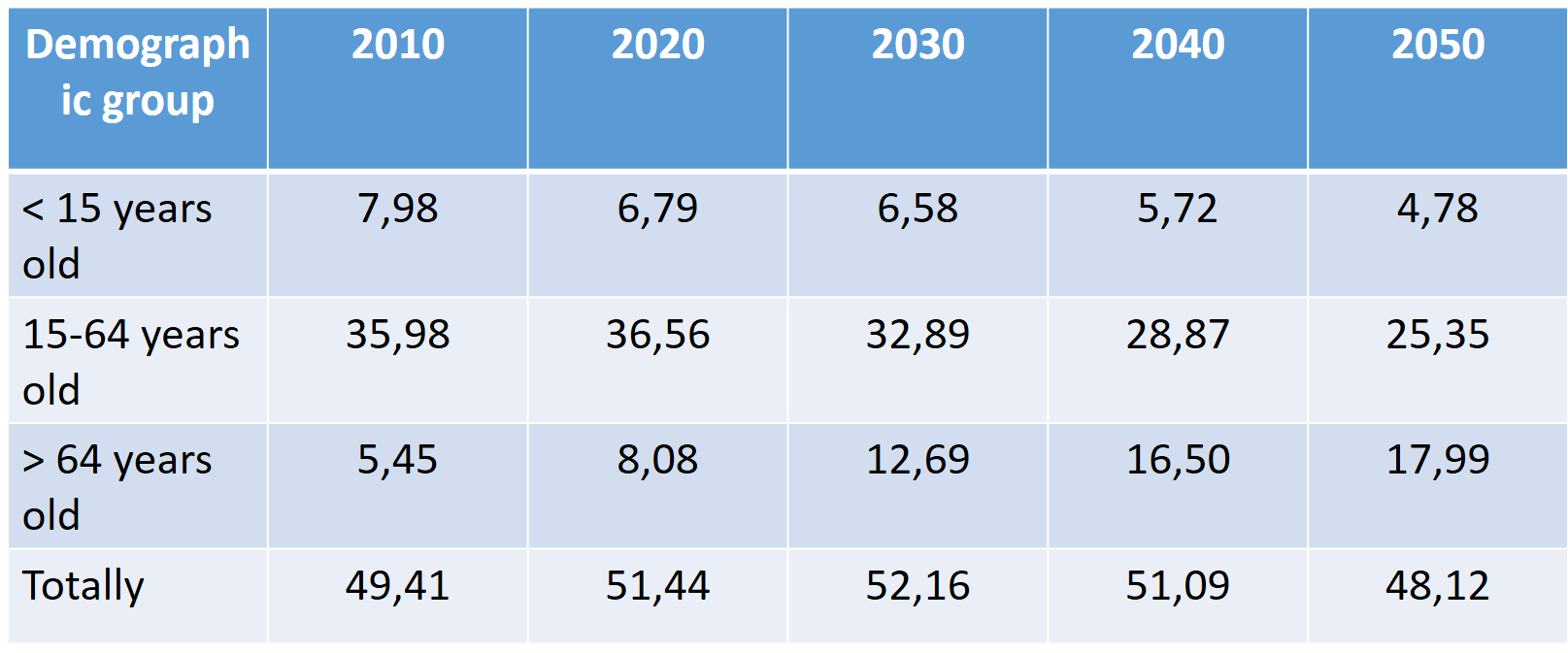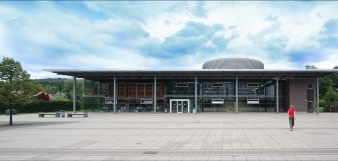The aging society in Korea
I. The importance of this topic
The aging society is a big problem in many countries, also in Germany. It is interesting how other countries deal with this problem. But there is one big difference between Korea and all the other countries with this problem of an aging society: the duration of this aging process took a lot of years in the other countries (for example 115 years in France or 103 years in Germany), so they had a lot of time to react and find solutions for this problem. In Korea, this aging process went very fast, so they don’t really have time to find good solutions and implement them. The korean state realized too late, that the aging society is a serious problem.
II. The current society and the future society of Korea

Figure 1 - Development of the number of korean inhabitants (in mio.) – Aging process 2010 - 2050
III. Reasons for the aging society in Korea
The confucianist society was influenced by the western culture. The government established the two-child-campaign to slow population growth, so they publicized not to have more than two kids. Nowadays korea has one of the lowest birth rates in the world. Only in a few areas the families get a support for the birth in the amount of 200.000 to 300.000 won or the fee for the public nursery is waived. And families with more than 2 children get a allowance for children as a tax abatement. But if you compare the costs that children cause with the support you get from the government, you will see, that (if you only regard the financial aspects) it is better not to bear a child in korea. So the government has to make it more attractive. And there are also too few day nurserys. There are a lot of women that are working in Korea, and they don‘t want to stop working or take the risk of losing their job just because they have to take care of the child. As already mentioned, children cause a lot of costs, for example costs for the education and the training. So a lot of families just can‘t effort it. Nowadays the divorce rate is getting higher and higher. So a lot of couples prevent to step aside from future barriers at the divorce. And there is also the change of the thinking of young koreans. Many koreans are thinking that you have a better life if you can enjoy life without bindings that having a women and children at home, which you have to take care of. Another reason for the aging society is the extension of the anticipated average life. The health care, the medical care and things like that are getting better and better, so there are more senior citizens and they are getting older and older.
IV. Rules and laws dealing with „senior citizens“ and the aging society
The korean government already noticed that there isn’t just the stereotype „Korean“. There are a lot of special groups of korean people that have special wants and needs. And because of the agin society, the number of the old Koreans (or „senior citizens“ as they are called in some acts) is increasing. So they implemented them and mentioned them in some rules and laws, for example:
• The Constituton of the Republic of Korea (Oct. 29, 1987), Article 34, Section 4 and 5
• Income tax act (Act No. 8911, Mar. 21, 2008), Article 51-2, Section 1
• Act on long-term care insurance for senior citizens (Act No. 08403, April 27, 2007), Article 1
• The Korea Housing Finance Corporation Act (Act No. 20653, Feb. 29, 2008), Article 3-2
V. My personal opinion / My own observation
The government has to make it more attractive to get children or to get more children, so it hast o concentrate on family policy and labor policy. Otherwise Korea won’t be able to handle this problem. Korea has to get completely away from the confucianism in the legal system. The legal system hast o be more oriented on the western legal systems than it is now. The citizens have tob e able to trust in their rights and claims and they have tob e able to rely on them. Only if they have confidence in the system, they will think about getting children or getting more children.
VI. Sources of information
• Alter und Alterungsprozesse im Rechtsleben in Korea – Huh, Prof. Dr. Young (Korea – wissenschaftlicher Aufbruch und soziale Umbrüche, Arbeits- und Diskussionspapier 1/2005).
• Alternde Gesellschaft – KORUM (Nr. 39, Juni 2012).
• Wolfgang Lutz, Vegard Skirbekk, and Maria Rita Testa, "The Low Fertility Trap Hypothesis: Forces That May Lead to Further Postponement and Fewer Births in Europe, "Vienna Yearbook of Population Research 2006 (2006): 167-192.
• Ministry for Health, Welfare, and Family Affairs, The Basic Plan on Aging Society and Population of Korea (Seoul: Ministry for Health, Welfare, and Family Affairs, 2010).
• Several acts and laws.
© Christoph Bieramperl (2016)
Diese Seite wurde noch nicht kommentiert.





